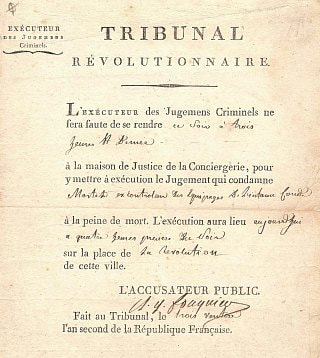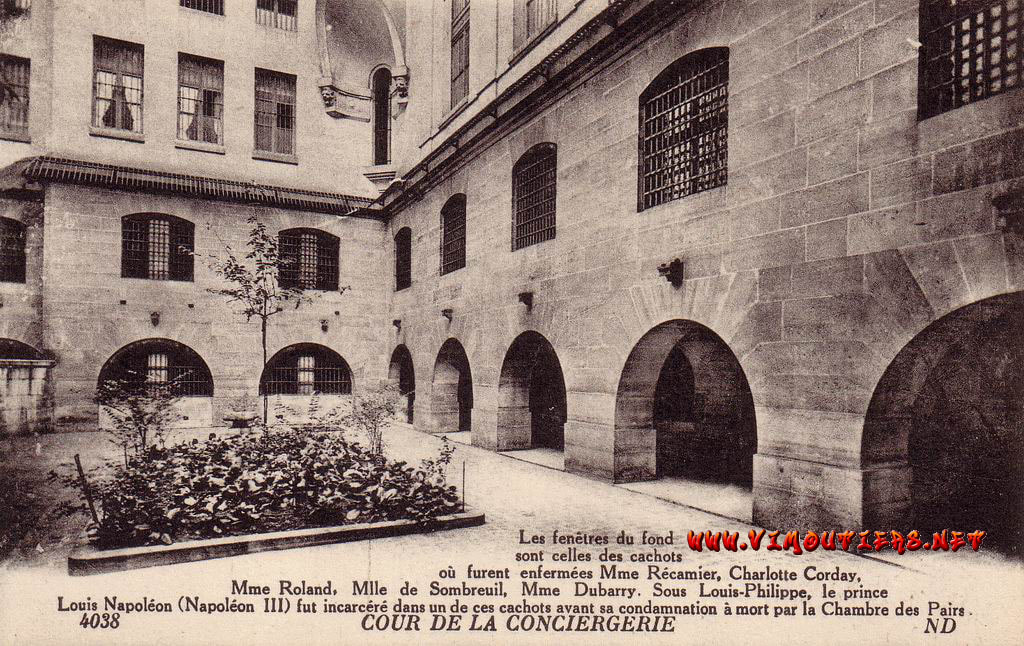|
Olympe was tried at the Conciergerie on 2 November 1793. After she was arrested on 20 July she had been held first, at the Prison de l'Abbaye, transfered to the hospital prison of La Petite Force - she was suffering from an infected cut on her leg - and finally she paid to be incarcerated at a private pension on Chemin Vert. The public prosecutor of the Revolutionary Tribunal was Antoine-Quentin Fouquier-Tinvinlle, a zealous and ruthless officer of the Terror, who took his turn at the Guillotine in 1795. Olympe was introduced as 'Marie Olympe de Gouges, veuve Aubry. born in Montauban, aged 38 (she was in fact close to 45), residence: rue du Harlay section du Pont Neuf'. She was charged with' having composed a work contrary to the expressed desire of the entire nation', and according to Article 1 of law of 29 march 1793: Whoever is convicted of producing writings advocation for the dissolution of national representation [...] will be sentenced to death." she was sentenced to death by the guillotine. She would have been excecuted on that same day, but, after the order was read, she announced that she was pregnant. 'My enemies will not have the glory of seeing my blood flow. I am pregnant and will bear a citoyen or citoyenne for the Republic' According to the law, she was to be examined by health officers who had been named by Robespierre 8 months previoulsy, after the Revolutionary Tribunal was founded, and by a Midwife, Veuve Prioux. Her cell at the Conciergerie was the same one Marie-Antoinette had been held in after her attempted escape. It was isolated, for the purpose of keeping prisoners 'au secret'. The infirmary was just outside that cell, a dire place, if we are to believe the description of a surviving prisoner, Beugnot: Seven by thirty metres, closed on both sides by iron fences, two narrow windows, vaulted roof, like some sort of gothic hell. 40 or 50 dirty straw beds on either side, with two or three patients each, sharing unwashed blankets. The privies were in the middle of the infirmaries, and there sick patients who had collapsed on the way lay in their own waste. The corpses, three or four each day, were removed at a specific hour of day, and until that time, the dead remained in bed with the sick. All that is now left of this room is one of its narrow windows, which is visible from the women's courtyard. The medical team concluded that if Olympe was pregnant, it was too early to tell. Fouquier-Tinville chose to ignore their doubt, and declared that her claim had been found to be false: The Public Prosecutor notes that the accused was incarcerated for the past five months and that according to regulations no contact was allowed between men and women in prisons. Therefore she made it up in order to avoid the death penalty. There was in fact much romantic commerce between prisoners, as they were kept in adjoining wards, and often not very efficiently. In any case, Olympe had been staying in a private pension for mixed prisoners, a fact that Fouquier Tinville chose to ignore.
2 Comments
9/11/2023 04:34:54 pm
I am an artist and bookbinder. I make small limited-edition handmade books of text that I like. I am currently working on Olympe de Gouge's Declaration of the Rights of Woman. I am thinking of including the transcript of her trial - at least in part. I came across your article and was wondering if I may include it. I will of course give an acknowledgment. To view the edition pages on my website the direct link is: https://www.tilleard.co.uk/limited-editions/page6.htm
Reply
Leave a Reply. |
About
This is where I live blog about my new book project, an intellectual biography of three French Revolutionary women philosophers. Categories
All
Archives
November 2022
|



 RSS Feed
RSS Feed